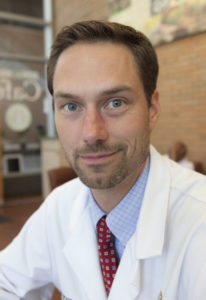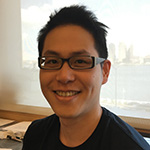
The FSH Society’s March 11, 2017, meeting in Manhattan was a milestone in our efforts to nurture a network of stakeholders in one of our most concentrated urban centers. Hosted by FSH Society Board member Stuart Lai, this meeting featured two stellar speakers, Matthew Harms, MD PhD, of Columbia University College of Medicine, and Jia-Ray Yu, PhD, a postdoctoral fellow working in the world-renowned laboratory of Danny Reinberg, of the Howard Hughes Medical Institute at New York University Langone School of Medicine.
Two dozen patients and family members from New York City and beyond attended. For many, it was their first time meeting others with FSH muscular dystrophy.
As a rare condition affecting an estimated 1 in 8,000 individuals in the general population, FSHD presents a challenge when it comes to gathering a critical mass of individuals who can have an impact in a region. The FSHD field is fortunate to have clinical centers of excellence in a handful of locations around the U.S., but it would benefit from having more, especially in densely populated cities. More patients and families would have greater access to high-quality care, and such centers would be well-positioned to develop into FSHD research leaders with the ability to conduct clinical studies and future drug trials.
Over the past two years, we had encouraging discussions with Michio Hirano, MD, Director of the H. Houston Merritt Center for Muscular Dystrophy and Related Diseases at Columbia. A recipient of one of the FSH Society’s first travel fellowships some two decades ago, Dr. Hirano has been highly supportive of promoting FSHD research and care at Columbia. In order to succeed, institutions need to recruit promising individuals by sparking their interest and providing incentives to work on FSHD. Easier said than done!

Around this time, Dr. Reinberg, an international leader in the science of gene regulation, joined the scientific advisory board of Fulcrum Therapeutics, a biotech company that has selected FSHD as one of the first diseases for which it will develop treatments. In the Reinberg lab, postdoctoral fellow Dr. Yu has taken an interest in focusing on gene regulation in FSHD.
Almost overnight, New York City now has basic researchers working on FSHD as well as clinicians with excellent knowledge of FSHD at two of its leading academic institutions. Our March 11 meeting was intended to share this great news with our members, and to introduce Drs. Harms and Yu to patients and families whose lives will be affected by their work.
The afternoon began as folks arrived a few at a time. Soon, the room was buzzing with conversation. People who had met at previous gatherings were happily reuniting. Newcomers were warmly welcomed. After people had arrived and settled in, Dr. Harms gave an introductory talk about FSHD genetics that was warmly praised by attendees for its clarity and ease of understanding.
Following this excellent background talk, Dr. Yu shared details about his work on understanding the expression of the DUX4 gene, widely accepted as playing a key role in FSHD. He explained his strategy to identify factors “upstream” that cause DUX4 to become expressed, as well as to understand the “downstream” consequences of DUX4 gene expression. Both “upstream” and “downstream” mechanism would be good targets for drug treatments.
The afternoon was a wonderful gathering of stakeholders, and a great example of how the Society brings people together to forge connections and, we hope, ignite new initiatives that can lead to progress for patients and for research.


Leave a Reply